
18 Best Writing Resources for Students
For students, writing a good essay is one of the most challenging parts about getting through a class or course. You may understand the lessons and you may even have a few interesting ideas on related topics. The big problem is putting that knowledge and those ideas into written form. Even with enough writing practice, you might still struggle to improve your writing skills due to certain challenges.
So check out these 18 writing resources and tools that will help you write better essays and improve your overall writing skills . Make the most of these resources for writers to run a grammar check, develop a better writing style, improve your essay organization, and more.
To improve writing skills and style
These resources will get you engaged on a deeper level with your writing, while helping you identify common problems with your work and ways to correct them.
1: Hemingway Editor
One of the leading free writing tools, the Hemingway Editor helps you improve the readability of your essays. Besides pointing out common errors, this writing software will highlight lengthy and complex sentences that make your essay difficult to read and understand. It suggests simpler alternatives to complex words and phrases and counts your adverb and passive voice usage, letting you know when it’s too excessive.
The Hemingway Editor will also grade the readability of your essay based on complexity. Ideally, you should aim for Grade 6 or lower, but that’s not always possible especially for highly technical topics and college-level essays.
2: Online tutoring on Wyzant
If you want to learn how to become a better writer, why not learn it straight from the experts? Wyzant offers a valuable writing resource to improve your writing skills with the help of a writing tutor. You will get personalized training on how to become a better writer by working on your weaknesses and moving lessons at your pace.
Your personal writing tutor will help you learn the basics such as how to improve your grammar and avoid common English mistakes. They will also teach you essentials such as how to write a research paper, how to write a thesis statement , how to write an essay, and more.
3: Thesaurus.com Writing Tool
Even if you have the basics down pat, there’s another challenge in the form of word choice. To present an exceptional paper, you want to avoid using overused and common words. At the same time, you want to make sure that you don’t overcomplicate your writing with jargon and overly complex words. The Writing Tool from Thesaurus.com provides you with a solution to this dilemma.
Enter your essay into the tool and hover your cursor over the words you want to swap, and you’ll have the option to look up synonyms for them. This simplifies the process of swapping words with better alternatives to improve your writing.
4: Cliché Finder
Similarly, the Cliché Finder also provides you with an excellent writing resource to avoid overused phrases that can make your writing look weak. In addition, it’ll also provide you with suggestions to replace certain words with stronger alternatives.
5: OneLook Dictionary Search
This free writing tool has a comprehensive treasury that can fuel and inform your writing efforts. OneLook Dictionary Search allows you to find definitions for words, find words and phrases that begin with a certain phrase or letter combination, find words related to a certain word or phrase, and more. So if you ever get stuck somewhere, use this resource for writers to get the word suggestions you need.
6: Write Rhymes
If an assignment ever calls for a poem and you want to follow a certain rhyme scheme, there’s a good chance you’ll run out of ideas at some point. Use this free writing tool to find a rhyme for the words you want to use.
Writing resources for proofreading and grammar
Before submitting a research paper, essay, email, manuscript, or any other written document, it is important to carefully proofread it. These resources can help get your work into tip-top shape.
7: Grammarly
One of the best and most popular free writing tools, Grammarly automatically detects common grammatical errors and punctuation mistakes as you write. You can install the extension to your browser, Microsoft Office suite, or desktop and enable easy proofreading and editing. Plus, the Grammarly Keyboard is one of the best writing apps for iPad or iPhone, in case you regularly work on your tablet or mobile.
8: Grammar Girl – Quick and Dirty Tips
The Grammar Girl podcast is one of the best free resources for writers as it regularly highlights common grammatical mistakes, writing tips, commonly confused words, word history, and other grammar-related questions. For example, its past episodes have highlighted top grammar myths, discussed whether to use “canceled” or “cancelled,” and more.
9: Proofreading Tool
If you’re looking for a Grammarly alternative, this is another useful tool for proofreading and editing. Just copy-paste your essay into the tool and it will automatically analyze it for issues. The Proofreading Tool helps you detect passive voice issues, vague phrases, duplicate words, misspellings, punctuation errors, misused words, awkward phrases, and more. With these highly detailed results, this writing resource offers an excellent solution to improve your essay.
If Proofreading Tool doesn’t meet your needs, you also have the option to use Typely instead. Enter your text into the editor and the tool will give you a detailed report of all the issues it detected. In addition, it also gives you stats about your writing, which includes reading difficulty level, sentiment analysis, and reading time.
Note-taking resources
When you’re researching for your writing project, taking notes helps you concentrate and process information. In order to take the best notes (read: useful, easy-to-follow notes), you must understand your source materials. Just like listening and reading are interactive tasks, taking notes allows you to organize and stay focused.
11: Evernote
Taking notes is crucial for students, as you need detailed and organized notes to write powerful research papers and essays. If you want to know how to take notes more effectively, it’s all about the tools you use. Evernote helps you take notes, add necessary attachments and resources, and organize them so you can easily find them again when you need them.
12: Notability – Ginger Labs
An excellent alternative to Evernote is Notability from Ginger Labs. This writing resource simplifies the process of taking notes and organizing them. It lets you create a note using a combination of handwriting, typing, and photos. It comes with built-in note-taking and sketching tools and lets you add and annotate PDFs.
Resources to help organize ideas
In your writing you need to make your ideas not only clear for yourself, but also for your readers. Organization is a matter of balancing your ideas, determining the most effective ways to relaying information, and how you convey it all to your readers.
13: Essay Outline Templates – Template Lab
One of the most challenging steps in essay writing is the part where you develop an essay outline . Of course, you might already have a fair idea of what you want to write but you’re not sure exactly how to turn those ideas into an outline. To make this process easier, Template Lab offers 30+ essay outline templates that you can use as examples.
With five types of essay outlines available for download, this is one of the most comprehensive essay writing resources for students.
14: Essay Shuffler
As difficult as it is to write an essay, what’s even more difficult is organizing it into a logical flow. Even if you’re following an outline, there’s a chance that some of your ideas may go all over the place as you write them. So make the most of Essay Shuffler in your essay organization efforts. This tool allows you to shuffle sentences between paragraphs so you can find a way to improve your writing flow and rearrange phrases that sound off.
15: Inspiration Maps
For those who need to build diagrams and create graphic organizers, Inspiration Maps is one of the best writing apps for iPad or iPhone. You can use it to create concept maps and process flows to organize your essay writing efforts and develop a logical visual outline for your essay. The drag and drop feature lets you shuffle and organize your ideas with ease.
Resources to enhance productivity
16: a soft murmur.
It’s easy to get distracted and lose focus on your writing when there’s a lot of noise in your surroundings. Shut out the street sounds and loud construction noises with this productivity tool that lets you listen to ambient sounds. The best part is that you can customize the sounds you want to hear and control their intensity. You can choose to listen to waves crashing, wind blowing, fire crackling, crickets chirping, and more.
17: Calmly Writer
Calmly Writer is another writing resource that enhances productivity by minimizing distraction. If you find all the toolbars and menu options on your writing software too distracting, you’ll love the minimalist layout of this tool. You get to work on a solid black space with only a blinking cursor. You can also access the hidden menu button by moving the cursor to your left.
18: StayFocusd
One of the easiest ways to get distracted from your writing projects is by spending time on entertainment websites and social media. Install the StayFocusd extension to your browser and limit the amount of time you spend on distracting websites. It lets you access them only for a certain amount of time and then blocks them for the rest of the day, allowing you to focus on writing your essay.
Bottom line
These are some of the best writing resources that will help students enhance their writing skills and knowledge as well as improve an existing piece of writing. Use the tools to guide your writing journey and the free learning resources to clarify any doubts or curiosities you might have. Most importantly, try working with a private writing tutor to address your unique weaknesses and improve your overall writing skills.

Jacqueline Zote is a copywriter with a passion for all things relating to the English language. Her interests range from pop culture and mythology to social activism. Her short fiction has appeared in anthologies published by HarperCollins Publishers and Zubaan Books.
Latest Posts

What Kind of Test Prep Tutors Can I Find on Wyzant?

Why Do Kanji Have Multiple Readings?

How to Type Katakana
Get to know us
In the News
Learn with us
Find a Tutor
Request a Tutor
Online Tutoring
Get Math Help
Learning Resources
Work with us
Careers at Wyzant
Apply to Tutor
Tutor Job Board
Download our free app
Let’s keep in touch
Feeling a little lost?
Start here or give us a call: (312) 646-6365
TUTORS BY SUBJECT
Algebra Tutors
Calculus Tutors
Chemistry Tutors
Computer tutors
Elementary Tutors
English Tutors
Geometry Tutors
Language Tutors
Math Tutors
Music Lessons
Physics Tutors
Reading Tutors
Science Tutors
Spanish Tutors
Statistics Tutors
Test Prep Tutors
Writing Tutors
TUTORS BY LOCATION
Atlanta Tutors
Boston Tutors
Brooklyn Tutors
Chicago Tutors
Dallas Tutors
Denver Tutors
Detroit Tutors
Houston Tutors
Los Angeles Tutors
Miami Tutors
New York City Tutors
Orange County Tutors
Philadelphia Tutors
Phoenix Tutors
San Francisco Tutors
Seattle Tutors
San Diego Tutors
Washington, DC Tutors
Making educational experiences better for everyone.
Comprehensive K-12 personalized learning
Rosetta Stone
Immersive learning for 25 languages
Fun educational games for kids
Vocabulary.com
Adaptive Learning for English vocabulary
Education.com
35,000 worksheets, games, and lesson plans
SpanishDict
Spanish-English dictionary, translator, and learning
- Skip to main content
- Skip to ChatBot Assistant
- Academic Writing
- Research Writing
- Critical Reading and Writing
- Punctuation
- Writing Exercises
- ELL/ESL Resources
Writing Resources

Academic Writing - Types of academic writing, the writing process, building an essay...
Research Writing - Steps in academic research, evaluating sources, developing research questions...
Critical Reading & Writing - Effective reading techniques, interpreting texts, strategies while you read...
Grammar - Nouns, verbs, adjectives, how to avoid fragments and run-ons...
Punctuation - Apostrophes, commas, colons, semi-colons...
Writing Exercises - Test your knowledge and practice what you have learned with writing exercises.
ESL/ELL Resources - Resources for English language learners
Writer's Complex Copyright
The content in Writing Resources originally was created for the Writer's Complex website by Cathy Copley, Larry Greenberg, Elaine Handley, Susan Oaks and contributors. Copyright 1995-96, Empire State University.
Contributors
Catherine Copley (File Cabinet, The Write Way)
Gary Goss (Language Games, reviewer)
Larry Greenberg (technical design)
Elaine Handley (Research Room, Grammar Workout, Punctuation Points)
Loretta Lussier (technical design assistant)
Lisa Mastrangelo (Essay Writing)
Bob Miner (Style Room)
Susan Oaks (Research Room, Grammar Workout, Punctuation Points, Essay Writing)
Alexandra Pickett (graphic design)
Jim Robinson (Writing Book Reviews)
Matthew Sanders (Essay Writing)
Herb Shapiro (reviewer)
Stephanie Thomas (technical design)
Joe Woods (Style Room)
- The Writer's Complex was copyrighted in 1996. It may be used as an Internet resource, but should not be modified under any circumstances.
- The Writer's Complex may not be printed, resold or redistributed for compensation without prior written permission from SUNY Empire State College.
- The Writer's Complex cannot be printed, reused or redistributed if credit is not given to SUNY Empire State College, Catherine Copley, Larry Greenberg, Elaine Handley and Susan Oaks.
Need Assistance?
If you would like assistance with any type of writing assignment, learning coaches are available to assist you. Please contact Academic Support by emailing [email protected].
Questions or feedback about SUNY Empire's Writing Support?
Contact us at [email protected] .
Smart Cookies
They're not just in our classes – they help power our website. Cookies and similar tools allow us to better understand the experience of our visitors. By continuing to use this website, you consent to SUNY Empire State University's usage of cookies and similar technologies in accordance with the university's Privacy Notice and Cookies Policy .
Looking to publish? Meet your dream editor, designer and marketer on Reedsy.
Find the perfect editor for your next book
1 million authors trust the professionals on Reedsy. Come meet them.
Blog • Perfecting your Craft
Last updated on Feb 07, 2023
The 23 Best Writing Tools of 2024: A Guide for Writers
Before the computer there was the typewriter, and before the typewriter there was pen and paper, and before pen and paper there were plenty of other lost tools of writing — like clay, papyrus, wood, slate, parchment, and, of course, pens made out of reeds. (Fun fact: the name “Reedsy” is inspired by the “reed pen,” which was used as early as 800 B.C. for documentation).
As you can tell by now, the act of writing has been a part of human culture from the days of chiseling stories onto the walls of caves — and as we have evolved, so have our writing tools . In fact, today’s writers and storytellers are spoiled for choice when it comes to deciding which tools to use.
The following list details our favorite writing tools and resources for taking any idea through to its written conclusion. If you want to cut straight to the chase and find out which is the right writing app for you, we recommend taking this quick 30-second quiz.
Which writing app is right for you?
Find out here! Takes 30 seconds
Otherwise, let's dive in!
Writing tools
We all know Google Docs and Microsoft Word, so we’re not going to waste your time giving those two a run-down in our list. Below are four other word processors you might not know about, and that are worth checking out.
1. Reedsy Book Editor
Cost: Free Does “fake it ‘til you make it” ring true to you? Well, the Reedsy Book Editor is a free, online word processor that formats your book as you write. See your drafts automatically turn into a professional-looking, ready-to-publish manuscript — and allow this glimpse of your work as the final product spur your motivation to write.

It comes with an automatic spell-checker — and a built-in goal reminder system to get you back into shape if you find that you're falling behind on your writing schedule! Another one of the Reedsy Book Editor’s best functions is that it lets you instantly typeset your manuscript to EPUB and print-ready PDF files.
Check it out if: if you want a writing tool that takes care of formatting and conversion for you.
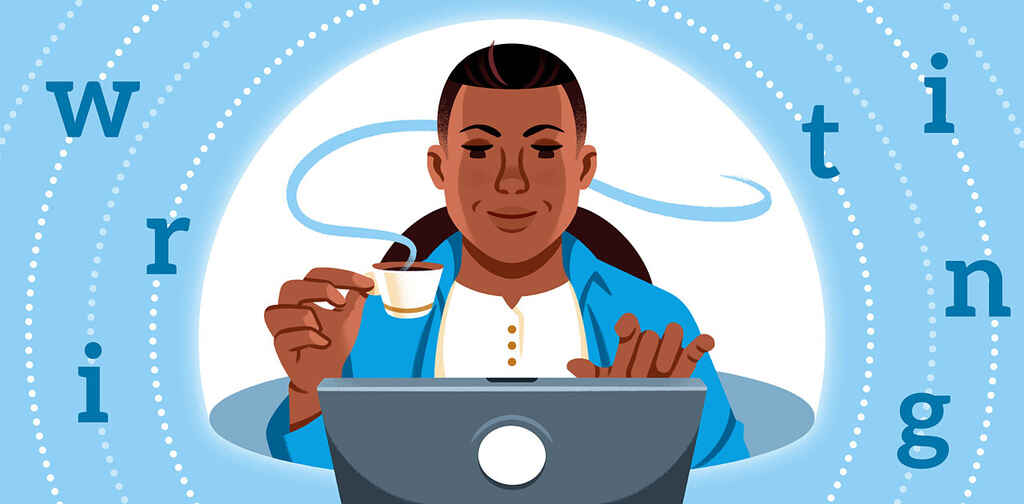
FREE WRITING APP
The Reedsy Book Editor
Set goals, track progress, and establish your writing routine in our free app.
Cost: Free Do you like a helpful tap on the shoulder, reminding you about something you need to do? Well, you’ll likely enjoy Draft then, because the book writing software not only keeps track of how many words you write per day, it can also email you daily reminders about your daily word count goals. (Of course, if this sounds a little too “hands-on” for you, you can always turn the reminder function off).
Other than that, Draft functions a lot like Google Docs: allowing you to track changes, collaborate via suggested edits, and make comments on the doc.
Check it out if: you like Google Docs, but want an even simpler interface.
3. LibreOffice
Cost: Free Yes, we did say that we wouldn’t mention Microsoft Word, because by now everyone knows that it’s a useful writing tool. But we didn’t say we wouldn’t mention its free counterpart: LibreOffice .
LibreOffice is the open source answer for people who want to try Microsoft without paying the price tag. (Open source means that the software is built on code that anyone can inspect and enhance). Plus it’s compatible with all of the regular file types people are used to, such as .doc, .docx, .xls, .xlsx, .ppt, and .pptx files.
Check it out if: you like a classic word processor — and moreover, a free one.
Cost: $50 (or try a 30-day free trial) The people behind Mellel don’t just know word processing — they also know catchy, memorable marketing. Their description of why writers should choose Mellel starts like this: “Mellel is a writer's dream come true. To start, it is exceedingly boring: it just works, day in and day out, reliably. An enormous number of people used Mellel to write and they all report that their journey with Mellel was boring and uneventful. As well it should. In other words, it does all the mundane bits, and leaves the creative stuff to you.”
Mellel is not free (and note that it’s only for Mac). In return for the price tag, you’ll get more book-specific tools than other, perhaps more traditional word processors — such as outlining and bibliography-making functions. And, judging by the witty, funny copy on Mellel’s website, Mellel makes the process of writing much more fun than they let on.
Check it out if: you’re a Mac user who wants more than the Pages app offers.
Organization tools
Plotters tend to finish their writing projects quicker than pantsers — simply because when they hit a wall, they have their notes or outlines to reference, allowing them to jump straight over that hurdle and hit the ground running. P.S. You can grab a free template for your book outline here in this comprehensive guide to outlining .
The following resources will help you keep your thoughts organized so that any bouts of writer’s block don’t slow you down.
5. Milanote
Cost: Free for basic plan or $12.50/month for premium. Milanote is an easy-to-use creative writing app to organize your research, ideas, characters and outline in one place.
The vast majority of novelist-oriented writing software is organized around the idea of a linear document. But for most people, writing isn’t linear — because thinking isn’t linear. Writing is about gradually getting a jumble of ideas into shape, and Milanote's writing app matches the way writers think.
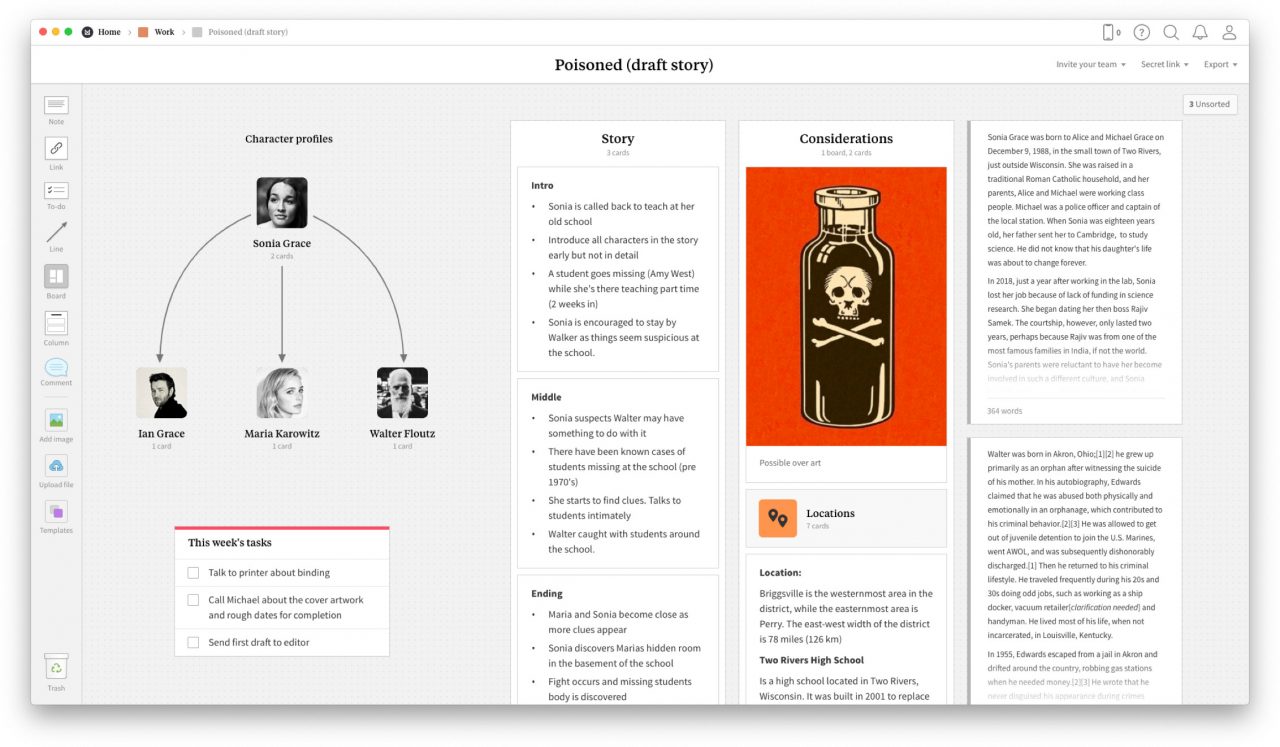
Check it out if: you're a plotter who likes a flexible workspace to organize ideas and see a birds-eye view of how your story outline is coming together.
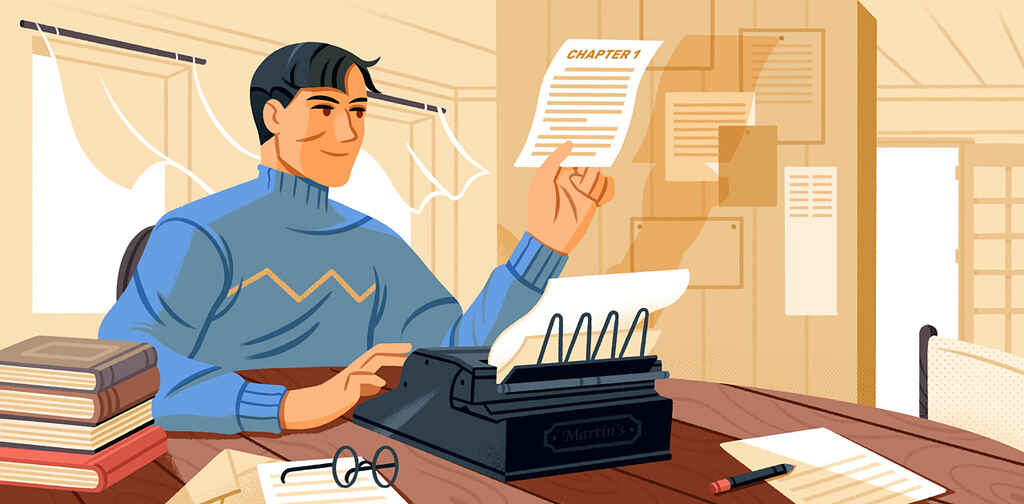
FREE RESOURCE
Get our Book Development Template
Use this template to go from a vague idea to a solid plan for a first draft.

6. Evernote
Cost: free for basic plan or $9.99/month for premium. Its cute, little green elephant logo aside, Evernote is a great and easy-to-use option for writers who could do with a little more organization in their lives.
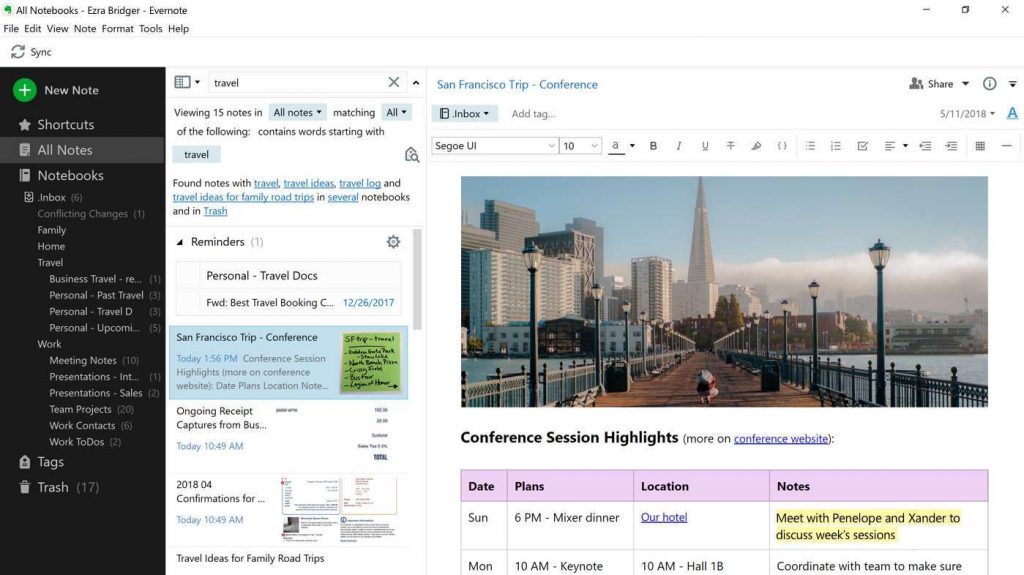
The app lets you quickly jot down thoughts, record audio notes, save online articles you’re hoping to reference, and it will sync all of this information across all of your Evernote-installed devices. What’s also handy about the app is the collaborative aspect of it: you can create shared accounts, so that multiple people can access saved documents at once.
Check it out if: you’re prone to getting great ideas while on the go, and need somewhere to make sure you don’t forget them by the time you’re home.
Cost: $5/month or $40/year (or try a 14-day free trial) While it’s ultimately a writing tool, one of the best assets of comprehensive programs like Ulysses or Scrivener are their organizational features. At the end of the day, whether you’re writing a blog post or a full-length novel, the seed of an idea doesn’t get too far without the ability to organize that idea into a cohesive piece of writing.
And that’s exactly what Ulysses allows you to do: organize your thoughts into a well-written work. This is accomplished through features like customizable writing goals and deadlines, plain text enhancements, a distraction-free typewriter mode, bookmarks, outlining functions, and more.
Check it out if: you’re working on a lengthy piece of non-fiction, like a blog post or essay. (For a comparison of Scrivener vs. Ulysses, keep reading!)
8. Scrivener
Cost: $45 (or a 30-use free trial) Literature and Latte ’s word processor is a popular writing tool — also, in large part, thanks to its organizational capabilities that seamlessly allow writers to turn fragmented ideas into a fully realized book/script/research paper/or whatever else you’re writing.
Scrivener vs Ulysses Apart from the price (Scrivener charges a one-time licensing fee while Ulysses charges yearly), the two platforms offer many of the same features. So we’ll focus on what makes the two programs different.
- Scrivener’s corkboard function is an absolute favorite for writers who rely on visual aid to help with outlining. The function looks like an actual corkboard, and lets writers pin notes to the board in chronological order.
- Scrivener offers templates for works such as fiction, essays, recipe collections, screenplays, comic books — which gives Scrivener another point for versatility.
- Ulysses boasts an interface that is slightly more clean and simple — so if ease-of-use is high on your priority list, it might be the better option for you.
- Ulysses offers a very helpful WordPress and Medium integration, which bloggers who publish on either of these platforms will love.
Check it out if: you’re working on a longer piece of content (like a book or screenplay) and want one comprehensive place to manage all your work. (And don’t forget to check out our equally as comprehensive review of Scrivener’s newest update : Scrivener 3!)
9. Hubspot's AI Content Writer
Cost: Free, with premium upgrade available
HubSpot’s Free AI Content Writer is designed to help bloggers streamline their content creation process. This tool can generate drafts of blog posts, website copy, emails, and more with ease and without additional resources, by relying on prompts or topics provided by users. For those suffering from writer's block, the AI content writer can also create outlines to help spur writing along.
For those already using HubSpot's marketing and sales tools, the AI content writer's integration will be extra handy.
Check it out if: you're a blogger short on time or inspiration.
Productivity tools
Alright, let’s kick things into high gear now. You know what you want to use to write, and your thoughts and ideas are concisely organized. If you’re finding it difficult to buckle down and get the job done (or struggle to write quickly or consistently), these resources will help you realize that Nike manta: just do it.
10. Ommwriter
Cost: free web version or $7 for the full program Do you find the clacking sound of old typewriters satisfying? Do you find soft, neutral colours calming? Does nothing really get you focused quite like a purposeful, long, deep breath? If so, Ommwriter might be the tool to help you reach your goal. As the site’s tagline reads, Ommwriter is “a perfect place to think and write.”
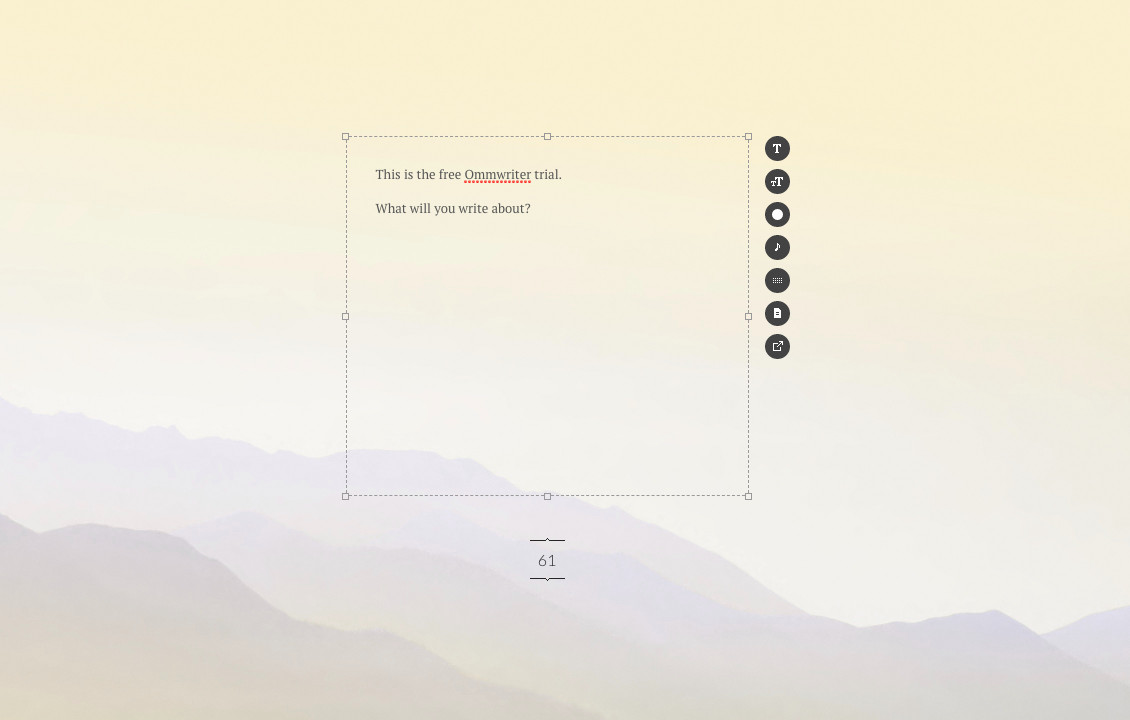
With soothing background noises, customizable keyboard noises, and peaceful backgrounds to choose from, Ommwriter could just be the “break” from everything else going on around you that you need to write.
Check it out if: your very best writing ideas come to you while in “savasana.”
11. To Doist
Cost: free or $4/month for premium plan Have you ever woken up in a cold sweat, panicking about something important you forgot to do? Or, god forbid, gripped in dread about how far behind you are on your word-count goals?
Well, To Doist might be able to help. It’s the ultimate app for creating to-do lists — but these aren’t your grandma’s pen-and-paper lists with little check marks beside them (though we mean no offense to your grandma). It lets you get a daily or weekly overview of your tasks, prioritize the tasks that are most important, and even lets you assign tasks to other people if you’re working on a specific goal with other collaborators.
Check it out if: you have never been able to find an agenda that’s souped up enough to keep you on track.

FREE COURSE
How to Build a Solid Writing Routine
In 10 days, learn to change your habits to support your writing.
12. Marinara Timer
Cost: Free The Pomodoro Technique is a time management method meant to promote productivity. In a nutshell, it stipulates that you should work for 25 minutes, then take a 5-minute break, then work for 25 minutes, take another 5-minute break, etc., etc.
The free-to-use Marinara Timer makes this easy for you by alerting you each time your work sessions and breaks are up. It also offers customizable timers in case the 25/5 isn’t quite right for keeping you on track. Fun fact: taking a break to stand up or walk (or do anything but sit!) every hour is also a good way to protect your back if you sit hunched at a computer working for long stretches at a time.
Check it out if: consistent breaks from work help actually keep you focused on the task at hand.
13. Cold Turkey
Cost: Free for basic plan or $20 for premium plan “Meet your match, Zuckerberg,” says Cold Turkey ’s tagline. In case that, paired with the writing tool’s name, doesn’t make it clear enough, Cold Turkey is a program that allows you to completely rid yourself of distraction. And when we say “completely,” we mean completely.
With Cold Turkey, you can block yourself from accessing certain websites — or even your entire computer — for periods at a time, only allowing you to use the current document you’re working on.
Check it out if: “willpower” is not a characteristic you’d ascribe yourself, and the only way for you to get something done is in a totally distraction-free state.
14. Freedom
Cost: $7/month or $29/year (or a 7-use free trial) Apart from pleasantly getting the “freedom” refrain from Aretha Franklin’s “Think” stuck in your head, the Freedom app is another resource that can turn your devices into tools of productivity once more.
It functions like Cold Turkey; however, a unique function of Freedom is the ability to sync your distraction-free periods across all your devices. So if you know that on Tuesdays, you want your computer, phone, and tablet to all block access to Twitter, Instagram, and Facebook — you can!
Check it out if: letting other people know not to bother you during your non-negotiable writing time isn’t enough, you need to let yourself know not to interrupt, well, yourself.
Cost: Free If total silence encourages your mind to wander, whereas light sensory action keeps your thoughts on the task at hand, Noisli will be a friend to you. The tool lets you choose from a range of soundtracks, such as rain, coffee shop, wind, lake, and more. You can mix several sounds at once, and choose the volume for each one. So let’s say you want to create the atmosphere of writing by a babbling brook, with a fire crackling next to you, and the moon shining brightly overhead. Noisli will make this happen for you!
Check it out if: you get the most work done with white noise.
Editing tools
If you’re planning to publish a book — or any kind of writing you’re hoping to make a profit from, it’s crucial that your work is thoroughly edited. To that end, working with a professional editor is an investment you should give serious thought to.
In the meantime, here are a few editing tools that can help you out along the way. Hopefully, they’ll either ensure a typo-free draft, so by the time you do work with an editor, they can spend less time fixing small typos and more time on big-picture work, or, if you decide to forego a professional edit, you’ll have the tools to do the best editing job you can.
16. Hemingway
Cost: Free The Hemingway app claims to make your writing “bold and clear.” It has a number of handy features like a word-counter and an automatic readability score. But its real use lies in the features that make suggestions to your prose. For instance, it might highlight a complex sentence that’s hard to read. It also highlights instances of passive voice , qualifiers, and adverbs. Let’s take a look at how this passage from Ernest Hemingway’s very own To Have and Have Not fares:

“Just” is highlighted because it’s a qualifier, and Hemingway suggests, instead: “Be bold. Don’t hedge.” The sentence in red is highlighted as being hard to read. And “probably” is pointed out as an adverb — the app suggests using a forceful verb instead.
Check it out if: you want to bring out your inner Ernie. (Curious what else Hemingway offers? Check out our full review of the app right here .)

NEW REEDSY COURSE
How to Write a Novel
Enroll in our course and become an author in three months.
17. Fictionary
Cost: $19/month or $169 per year
The Fictionary Story Editing software creates intelligent visuals that help you improve your story's structure, characters, plot, and settings. Using Natural Language Processing, Fictionary identifies your key story arc scenes and gives you actionable insights to improve the structure of your book. Annual subscribers get access to year-round live classes on writing and editing. Think of it like Peloton for writers. Check it out if: You want to get your story structure in the best possible shape before submitting to agents and/or editors.
18. Marlowe Pro
Cost: $29.95/mth or $199/year; $45 for single reports
This manuscript assessment tool will provide in-depth feedback on your novel within minutes. Using artificial intelligence, Marlowe can analyze your plot, pacing, story beats, and readability — then provide actionable insights (as well as comp titles ) based on its database of bestsellers across a number of genres.
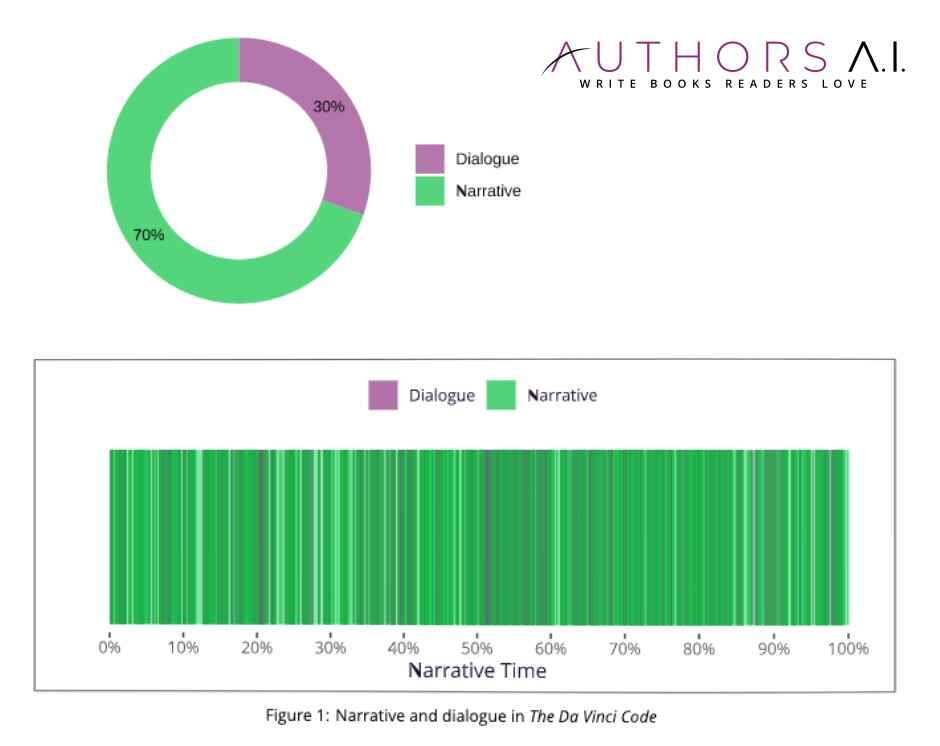
To try out this AI editor, claim a free report by entering REEDSYFREE at checkout. And for a 15% discount on a Marlowe Pro subscription , enter REEDSY15OFF when prompted at checkout.
Check it out: to take a scientific and methodical approach to your developmental edits.
19. Cliché Finder
Cost: Free Cliché Finder is exactly what it says on the tin: it combs through your writing in search of clichés, and then highlights them for you. It’s not always necessarily bad to use clichés in your writing, but when you do, you want to be purposeful about it (and not to mention aware of it!).
Check it out if: you want to avoid clichés like the plague, and for your book to sell like hotcakes — and the rest is history.
20. Grammarly
Cost: Free Have you ever sent an email, only to realize that you'd made a glaring typo just as you hit “Send”? Well, no more!
Grammarly essentially functions like the spell checker tool from Microsoft Word or Google Docs, but here’s the great part: it’s a plug-in that will work wherever you happen to writing. That means Twitter, Gmail, Google Docs, Facebook — anywhere. Plus it offers vocabulary or alternate word suggestions — for instance, it might suggest you replace “walking aimlessly,” with the word “wandering.” For a more in-dept analysis, check our full Grammarly review .
Check it out if: you’re typo-prone! (Read below for a comparison of Grammarly vs. ProWritingAid.)
21. ProWritingAid
Cost: Free browser extension or $79/year for the full software ProWritingAid is a tool you can install that will proofread and spell check your material for you , no matter where you’re writing. It will also offer suggestions to improve your overall language — outside of just grammatical technicalities. (You can even get 20% off via this special offer !)
ProWritingAid vs Grammarly The two programs offer a lot of the same services, so you might be wondering which one to pick. We have a review of ProWritingAid that dives deep into this comparison, but the main differences are:
- Grammarly is free to use, and while ProWritingAid offers a free Google Chrome plug-in, this free option only offers spell checking services, it won’t make editorial suggestions.
- ProWritingAid is slightly more tailored towards authors, while Grammarly is a slightly better fit for articles and essays. Ultimately, both tools lend a very helpful editing hand, so deciding between the two mostly boils down to the one you enjoy using more.
Check it out if: you want to make sure your writing is as polished as possible.
Workspace tools
At the end of the day, all you really need to write is a pen and paper. All the fancy tools and apps in the world won’t get the words out for you. That being said, creating an environment that’s appealing — and conducive! — to write in can make the whole process more enjoyable, and encourage you to get the job done.
Here are few physical tools to look over if you’re thinking of sprucing up your workspace.
22. Livescribe Pen
Cost: starts at $100 If you prefer writing on paper, but dread the process of transferring your words to a computer, Livescribe will likely be right up your alley. Through Bluetooth technology, the pen can actually transcribe your pen and paper words to your device. What’s more, it can also transcribe voice notes into digital documents for you.
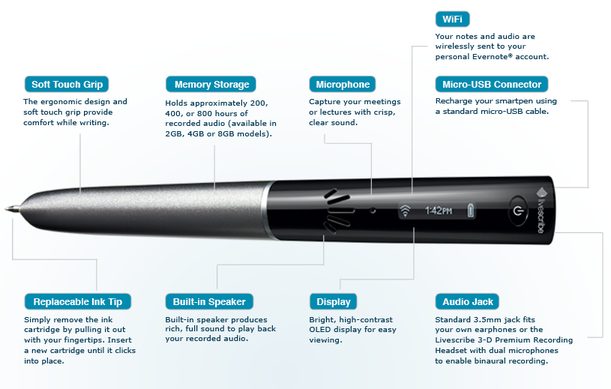
Check it out if: you’ve ever felt envy at Rita Skeeter’s Quick-Quotes Quill in Harry Potter and the Goblet of Fire .
23. Ergonomic desk setups
Cost: Varies As more and more of the workforce moves to sedentary jobs where the majority of 9am to 5pm is spent sitting — usually hunching — at a computer, a growing number of sitting-related health injuries have been occurring. That’s why looking into more ergonomically friendly desk setups is a good idea for writers who spend long hours at the computer — or even writing in a notebook. This could be a standing desk, or even just a number of textbooks piled under your desktop so that your screen is eye level, resulting in less stress on your shoulders.
Check it out if: you don’t want writing gains to come at the cost of growing back pains.
24. Computer Glasses
Cost: Varies Writers are all familiar with computer-caused eyestrains. Because you blink far less when looking at a screen than you do otherwise, computer vision syndrome (CVS) is a condition people have been developing due to long stretches of staring at a computer.
One way to help alleviate this — other than just making sure to take time looking away from your computer — is to invest in some computer glasses. They typically come in blue or amber shades, and are coated with a protective coating.
There are several brands you can check out, such as Pixel Eyewear or Felix Gray .
Check it out if: you notice itchy or tired eyes after long writing sessions.
Have you tried any of the above writing tools — and if so, which were your favorites? Or maybe you feel there are some great resources missing from this list? Let us know in the comments below!
Mystic says:
24/10/2019 – 03:38
I tried Cliche Finder several times and it found a couple of items in my text, but it didn't highlight where it was at. The rest of the tools here, that I can use since I'm on a strict income, are amazing!
Comments are currently closed.
Continue reading
Recommended posts from the Reedsy Blog

How Many Sentences Are in a Paragraph?
From fiction to nonfiction works, the length of a paragraph varies depending on its purpose. Here's everything you need to know.

Narrative Structure: Definition, Examples, and Writing Tips
What's the difference between story structure and narrative structure? And how do you choose the right narrative structure for you novel?

What is the Proust Questionnaire? 22 Questions to Write Better Characters
Inspired by Marcel Proust, check out the questionnaire that will help your characters remember things past.

What is Pathos? Definition and Examples in Literature
Pathos is a literary device that uses language to evoke an emotional response, typically to connect readers with the characters in a story.

How to Start a Children’s Book: Coming Up with Your Big Idea
If you've ever dreamed of writing a children's book but aren't sure where to start, check out this post to learn more about how you can create the perfect story for kids.

How to Become a Travel Writer in 5 Steps: A Guide for Travel Bugs
If you want to get paid to share your adventures, learn how to become a travel writer with these five tips.
Join a community of over 1 million authors
Reedsy is more than just a blog. Become a member today to discover how we can help you publish a beautiful book.

The ultimate app for outlining
Structure your story with the free Reedsy Book Editor.

1 million authors trust the professionals on Reedsy. Come meet them.
Enter your email or get started with a social account:

OASIS: Writing Center
Writing a paper: overview, writing a paper.
The Walden Writing Center staff is dedicated to ensuring your transition to a writing intensive program is a smooth one. In the pages listed on the left you will find all the information you need to master the craft of scholarly writing.
If you are new to scholarly writing, it may be helpful to remember that writing is a process, not an event. Some common steps in the life cycle of a writing project are outlined below. Click each step to access information and resources on that topic, or navigate through our interactive "Life Cycle of a Paper" project at the bottom of the page.
Good luck with your scholarly writing, and if you have questions, Ask OASIS .
Writing Process
Click on each step to find out more about each part of the writing process.
Crash Course in Scholarly Writing Video Playlist
Note that these videos were created while APA 6 was the style guide edition in use. There may be some examples of writing that have not been updated to APA 7 guidelines.


Related Resources
Didn't find what you need? Search our website or email us .
Read our website accessibility and accommodation statement .
- Next Page: Goal Setting
- Office of Student Disability Services
Walden Resources
Departments.
- Academic Residencies
- Academic Skills
- Career Planning and Development
- Customer Care Team
- Field Experience
- Military Services
- Student Success Advising
- Writing Skills
Centers and Offices
- Center for Social Change
- Office of Academic Support and Instructional Services
- Office of Degree Acceleration
- Office of Research and Doctoral Services
- Office of Student Affairs
Student Resources
- Doctoral Writing Assessment
- Form & Style Review
- Quick Answers
- ScholarWorks
- SKIL Courses and Workshops
- Walden Bookstore
- Walden Catalog & Student Handbook
- Student Safety/Title IX
- Legal & Consumer Information
- Website Terms and Conditions
- Cookie Policy
- Accessibility
- Accreditation
- State Authorization
- Net Price Calculator
- Contact Walden
Walden University is a member of Adtalem Global Education, Inc. www.adtalem.com Walden University is certified to operate by SCHEV © 2024 Walden University LLC. All rights reserved.
Introducing the new Spartan Search

Take the Library Survey and enter to win a prize!
Practical algebra.
- Macdonald-Kelce Library
Writing a Research Paper
Steps in a research paper.
- Linear Functions
- Quadratic Functions
- Exponential Functions
- Logarithmic Functions
Typically a research paper is meant to answer a research question or solve a research problem.
A research paper is form of scholarship. Scholarship is meant to accurately represent the natural world or the human experience.
Unlike a persuasive paper that might diminish some facts and emphasize other facts, a scholarly work takes as much information into account as possible and attempts to explain what is happening to create this problem (thereby presenting possibilities for solving the problem), or answering how this situation (whether in the natural world or human experience) has come about.
As a student you are not expected to have comprehensive knowledge of an academic discipline. However, it is important to know the craft of scholarship since it is our best effort to accurately understand the world.
One of the constraints of scholarship is that it must be peer-reviewed before it is published as scholarly content. This means that experts in the field, with demonstrated comprehensive knowledge of the topic being addressed, review the scholarly work before it is printed and confirm that the work enhances our understanding of the topic (or, most often, reject the work as not being rigorous enough, or for containing errors).
Once scholarship is published it may continue to be challenged as scholars continue to refine their, and our, understanding of the world.
The interest
Developing a question
Uncovering scholarship
Writing the paper
- << Previous: Macdonald-Kelce Library
- Next: Datasets >>
- Last Updated: Mar 27, 2024 2:54 PM
- URL: https://utopia.ut.edu/c.php?g=1389249
Macdonald-Kelce Library - The University of Tampa - 401 W. Kennedy Blvd. - Tampa, FL 33606 - 813 257-3056 - [email protected] - Accessibility

- International
- Schools directory
- Resources Jobs Schools directory News Search

AQA English Language Paper 1 Writing Revision
Subject: English
Age range: 14-16
Resource type: Lesson (complete)
Last updated
27 March 2024
- Share through email
- Share through twitter
- Share through linkedin
- Share through facebook
- Share through pinterest

AQA English Language Paper 1 revision lesson on Section B or Question 5 (Descriptive Writing/Narrative Writing).
We explore an example exam question and look at approaches to descriptive writing, focusing on structure and organisation, preparing us for the exam for the 2024 summer.
The lesson includes worksheets, differentiated and adaptive learning approaches, revision tips, timings, success criteria and more, as well as model examples of planning.
A really useful way of revising these questions in time for the Paper 1 exam in May 2024.
***Leave a review and we’ll send you another masterclass for free. Just email [email protected] once you’ve left your review!
Tes paid licence How can I reuse this?
Your rating is required to reflect your happiness.
It's good to leave some feedback.
Something went wrong, please try again later.
This resource hasn't been reviewed yet
To ensure quality for our reviews, only customers who have purchased this resource can review it
Report this resource to let us know if it violates our terms and conditions. Our customer service team will review your report and will be in touch.
Not quite what you were looking for? Search by keyword to find the right resource:
Trying to devise a structure for your essay can be one of the most difficult parts of the writing process. Making a detailed outline before you begin writing is a good way to make sure your ideas come across in a clear and logical order. A good outline will also save you time in the revision process, reducing the possibility that your ideas will need to be rearranged once you've written them.
The First Steps
Before you can begin outlining, you need to have a sense of what you will argue in the essay. From your analysis and close readings of primary and/or secondary sources you should have notes, ideas, and possible quotes to cite as evidence. Let's say you are writing about the 1999 Republican Primary and you want to prove that each candidate's financial resources were the most important element in the race. At this point, your notes probably lack much coherent order. Most likely, your ideas are still in the order in which they occurred to you; your notes and possible quotes probably still adhere to the chronology of the sources you've examined. Your goal is to rearrange your ideas, notes, and quotes—the raw material of your essay—into an order that best supports your argument, not the arguments you've read in other people's works. To do this, you have to group your notes into categories and then arrange these categories in a logical order.
Generalizing
The first step is to look over each individual piece of information that you've written and assign it to a general category. Ask yourself, "If I were to file this in a database, what would I file it under?" If, using the example of the Republican Primary, you wrote down an observation about John McCain's views on health care, you might list it under the general category of "Health care policy." As you go through your notes, try to reuse categories whenever possible. Your goal is to reduce your notes to no more than a page of category listings.
Now examine your category headings. Do any seem repetitive? Do any go together? "McCain's expenditure on ads" and "Bush's expenditure on ads," while not exactly repetitive, could easily combine into a more general category like "Candidates' expenditures on ads." Also, keep an eye out for categories that no longer seem to relate to your argument. Individual pieces of information that at first seemed important can begin to appear irrelevant when grouped into a general category.
Now it's time to generalize again. Examine all your categories and look for common themes. Go through each category and ask yourself, "If I were to place this piece of information in a file cabinet, what would I label that cabinet?" Again, try to reuse labels as often as possible: "Health Care," "Foreign Policy," and "Immigration" can all be contained under "Policy Initiatives." Make these larger categories as general as possible so that there are no more than three or four for a 7-10 page paper.
With your notes grouped into generalized categories, the process of ordering them should be easier. To begin, look at your most general categories. With your thesis in mind, try to find a way that the labels might be arranged in a sentence or two that supports your argument. Let's say your thesis is that financial resources played the most important role in the 1999 Republican Primary. Your four most general categories are "Policy Initiatives," "Financial Resources," "Voters' Concerns," and "Voters' Loyalty." You might come up with the following sentence: ÒAlthough McCain's policy initiatives were closest to the voters' concerns, Bush's financial resources won the voters' loyalty.Ó This sentence should reveal the order of your most general categories. You will begin with an examination of McCain's and Bush's views on important issues and compare them to the voters' top concerns. Then you'll look at both candidates' financial resources and show how Bush could win voters' loyalty through effective use of his resources, despite his less popular policy ideas.
With your most general categories in order, you now must order the smaller categories. To do so, arrange each smaller category into a sentence or two that will support the more general sentence you've just devised. Under the category of "Financial Resources," for instance, you might have the smaller categories of "Ad Expenditure," "Campaign Contributions" and "Fundraising." A sentence that supports your general argument might read: "Bush's early emphasis on fundraising led to greater campaign contributions, allowing him to have a greater ad expenditure than McCain."
The final step of the outlining process is to repeat this procedure on the smallest level, with the original notes that you took for your essay. To order what probably was an unwieldy and disorganized set of information at the beginning of this process, you need now only think of a sentence or two to support your general argument. Under the category "Fundraising," for example, you might have quotes about each candidate's estimation of its importance, statistics about the amount of time each candidate spent fundraising, and an idea about how the importance of fundraising never can be overestimated. Sentences to support your general argument might read: "No candidate has ever raised too much money [your idea]. While both McCain and Bush acknowledged the importance of fundraising [your quotes], the numbers clearly point to Bush as the superior fundraiser [your statistics]." The arrangement of your ideas, quotes, and statistics now should come naturally.
Putting It All Together
With these sentences, you have essentially constructed an outline for your essay. The most general ideas, which you organized in your first sentence, constitute the essay's sections. They follow the order in which you placed them in your sentence. The order of the smaller categories within each larger category (determined by your secondary sentences) indicates the order of the paragraphs within each section. Finally, your last set of sentences about your specific notes should show the order of the sentences within each paragraph. An outline for the essay about the 1999 Republican Primary (showing only the sections worked out here) would look something like this:
I. POLICY INITIATIVES
II. VOTERS' CONCERNS
III. FINANCIAL RESOURCES
A. Fundraising
a. Original Idea
b. McCain Quote/Bush Quote
c. McCain Statistics/Bush Statistics
B. Campaign Contributions
C. Ad Expenditure
IV. VOTERS' LOYALTY
Copyright 2000, David Kornhaber, for the Writing Center at Harvard University
Purdue Online Writing Lab Purdue OWL® College of Liberal Arts
Writing Task OWL Resource List

Welcome to the Purdue OWL
This page is brought to you by the OWL at Purdue University. When printing this page, you must include the entire legal notice.
Copyright ©1995-2018 by The Writing Lab & The OWL at Purdue and Purdue University. All rights reserved. This material may not be published, reproduced, broadcast, rewritten, or redistributed without permission. Use of this site constitutes acceptance of our terms and conditions of fair use.
This resource will help you find OWL material for the many different kinds of writing tasks you may face in school and in the workplace.
What kind of writing task do you need to complete? The list below will help you pinpoint the OWL’s resources that will be most helpful for you according to the kind of writing you need to accomplish.
If you’d like to see a complete list of our resources, please visit the OWL's main page .
When You’re Just Beginning Your Writing Task
- Understanding Writing Assignments
- Prewriting (Invention)
- Writer's Block/Writer's Anxiety
- Developing an Outline
- Audience Analysis
When You’re Ready to Compose Your Writing Task
For an Abstract:
- Writing Report Abstracts
- Writing Scientific Abstracts Presentation
- Conciseness
For an Academic Research Paper:
- Writing a Research Paper
- Evaluating Sources of Information
- Quoting, Paraphrasing, and Summarizing
Style Guides (for citation format):
- Chicago Manual of Style
For a Bibliography or Annotated Bibliography:
- American Sociological Association
- Chicago Manual Style Guides
- Annotated Bibliographies
For an Argument or Position Paper:
- Developing Strong Thesis Statements
- Logic in Argumentative Writing
- Organizing Your Argument Presentation
- Introductions, Body Paragraphs, and Conclusions for Argument Papers
For a Book Report or Book Review:
- Writing a Book Report
- Writing a Book Review
For a Business or Cover Letter:
- Writing the Basic Business Letter
- Business Letters: Accentuating the Positives
- Cover Letter Presentation
- Academic Cover Letters
For a Curriculum Vitae:
- Writing the Curriculum Vitae
For an Email:
- Email Etiquette
- Email Etiquette for Students
For an Exploratory Essay:
- Essay Writing
- Introductions, Body Paragraphs, and Conclusions for Exploratory Essays
For a Literary Analysis Essay:
General Advice:
- Writing About Literature
- Writing a Literary Analysis Presentation
- Literary Theory and Schools of Criticism
Writing About a Novel or Story:
- Writing About Fiction and Performing Close Reading
Writing About a Poem:
- Writing About Poetry
For a Literature Review:
- Social Work Literature Review Guidelines
- Writing in Psychology: Experimental Report Writing
For a Memo:
- Memo Writing
For a Narrative or Descriptive Essay:
- Essay Writing: The Narrative Essay
- Essay Writing: The Descriptive Essay
For a Personal Statement or Statement of Purpose:
- Writing the Personal Statement
For a Poster Presentation:
- INDOT Poster Design Handout
- Visual Rhetoric
- Color Theory Presentation
For a PowerPoint Presentation:
- Designing an Effective PowerPoint Presentation
- Using Fonts with Purpose
For a Report:
- Handbook on Report Formats
- Writing Engineering Reports
For a Résumé:
- Résumés
- Résumé Design
- Résumé Workshop
For a Visual Analysis Paper:
- Visual Rhetoric: Analyzing Visual Documents
For a White Paper:
- Writing a White Paper
- Prioritizing Your Concerns for Effective Business Writing
To Revise, Proofread, and Polish Your Writing:
- Proofreading Your Writing

IMAGES
VIDEO
COMMENTS
The Online Writing Lab at Purdue University houses writing resources and instructional material, and we provide these as a free service of the Writing Lab at Purdue. Students, members of the community, and users worldwide will find information to assist with many writing projects.
In this post, we have pulled together 8 tools and resources that will help you work better and smarter when writing a research paper. Our downloadable comprehensive free guide: Writing your paper. Todoist: A to-do list to organize your work. Evernote: As a research notebook. Grammarly: Cloud based typing assistant.
Tips for Reading an Assignment Prompt. Asking Analytical Questions. Thesis. Introductions. What Do Introductions Across the Disciplines Have in Common? Anatomy of a Body Paragraph. Transitions. Tips for Organizing Your Essay. Counterargument.
Writing Resources expand_more. Overview; Strategies for Essay Writing; Brief Guides to Writing in the Disciplines ... Strategies for Essay Writing: Downloadable PDFs. Strategies for Essay Writing: PDFs Strategies for Essay Writing--Complete. description. Tips for Reading an Assignment Prompt. description. Asking Analytical Questions ...
Together with our team and highly qualified editors, we help you answer all your questions about academic writing. Open 24/7 - 365 days a year. Always available to help you. Meet the team. Verified reviews. customer 18 March 2024.
Writing a research paper requires you to demonstrate a strong knowledge of your topic, engage with a variety of sources, and make an original contribution to the debate. ... Instead, we recommend visiting our AI writing resources page to learn how to use AI tools responsibly. Write a first draft of the research paper.
Welcome to the Writing Center! We are staffed by trained tutors who provide individual conferences to students working on any writing assignment. You don't have to have a finished paper to come for a conference. You can come with ideas, notes, or a draft.
Use this free writing tool to find a rhyme for the words you want to use. Writing resources for proofreading and grammar. Before submitting a research paper, essay, email, manuscript, or any other written document, it is important to carefully proofread it. These resources can help get your work into tip-top shape. 7: Grammarly
Essay Writing. This resource begins with a general description of essay writing and moves to a discussion of common essay genres students may encounter across the curriculum. The four genres of essays (description, narration, exposition, and argumentation) are common paper assignments you may encounter in your writing classes.
Upload your paper & get a free Expert Check. The pages in this section cover the following topic areas related to the process of writing a research paper: Genre - This section will provide an overview for understanding the difference between an analytical and argumentative research paper. Choosing a Topic - This section will guide the student ...
Writing Resources provides learners with a vast amount of self-paced learning material to help develop different areas of academic writing. Select from the list below to go to the writing resource most appropriate to your needs. Academic Writing - Types of academic writing, the writing process, building an essay...
Free AI Writing Resources Improve your writing with AI. Improve your academic performance and write like a pro without cheating or jeopardizing your degree. Get access to free AI writing tools, useful ChatGPT prompts, the latest articles about AI, and more. ... Generate three possible research questions for an argumentative high school essay on ...
5. Milanote. Cost: Free for basic plan or $12.50/month for premium. Milanote is an easy-to-use creative writing app to organize your research, ideas, characters and outline in one place. The vast majority of novelist-oriented writing software is organized around the idea of a linear document.
Writing Resources. Guides psychology. Strategies for Essay Writing. article. Brief Guides to Writing in the Disciplines. newspaper. Writing Advice: The Barker Underground Blog. Other Resources Harvard Guide to Using Sources. Advice from the Harvard Writing Center tutors.
Writing a Paper. The Walden Writing Center staff is dedicated to ensuring your transition to a writing intensive program is a smooth one. In the pages listed on the left you will find all the information you need to master the craft of scholarly writing. If you are new to scholarly writing, it may be helpful to remember that writing is a ...
Unlike a persuasive paper that might diminish some facts and emphasize other facts, a scholarly work takes as much information into account as possible and attempts to explain what is happening to create this problem (thereby presenting possibilities for solving the problem), or answering how this situation (whether in the natural world or ...
A report writing format includes a title, table of contents, summary, introduction, body, conclusion, recommendations and appendices. Top report writing tips include writing a report outline, creating the body of the report before the introduction or conclusion, sticking to facts, and keeping your appendix at a reasonable size.
For example, writing an article for a school newspaper is not the same as writing an article for a local newspaper. Also, ensure the tone and style are consistent throughout the whole [piece]."
AQA English Language Paper 1 revision lesson on Section B or Question 5 (Descriptive Writing/Narrative Writing). We explore an example exam question and look at approaches to descriptive writing, focusing on structure and organisation, preparing us for the exam for the 2024 summer.
Making a detailed outline before you begin writing is a good way to make sure your ideas come across in a clear and logical order. A good outline will also save you time in the revision process, reducing the possibility that your ideas will need to be rearranged once you've written them. The First Steps. Before you can begin outlining, you need ...
DuBrin has experience in human resource management and is a business and personal consultant in career management, leadership, and management development. Dr. DuBrin is an established author of both textbooks and trade books, and he contributes to professional journals, magazines, newspapers, and online media.... Leadership: Research Findings, Practice, and Skills Andrew J. DuBrin Cengage ...
When You're Ready to Compose Your Writing Task. For an Abstract: For an Academic Research Paper: Style Guides (for citation format): For a Bibliography or Annotated Bibliography: For an Argument or Position Paper: For a Book Report or Book Review: For a Business or Cover Letter: For a Curriculum Vitae:
Industry: Basic Chemical Manufacturing , Steel Product Manufacturing from Purchased Steel , Nonferrous Metal (except Aluminum) Production and Processing , Architectural and Structural Metals Manufacturing , Forging and Stamping See All Industries, Warehousing and Storage , Fuels and radioactive compounds, Steel pipe and tubes, Primary nonferrous Metals, nec, Miscellaneous Metalwork, Metal ...
Find company research, competitor information, contact details & financial data for BETA GIDA, OOO of Elektrostal, Moscow region. Get the latest business insights from Dun & Bradstreet.